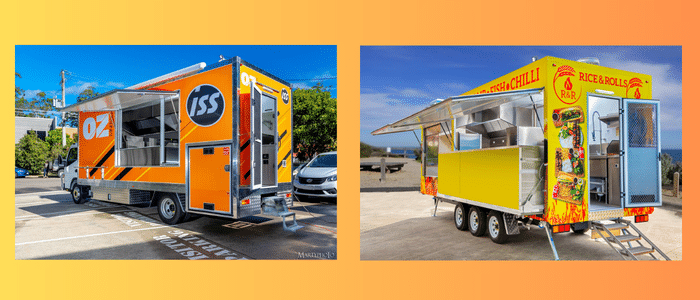Food trucks and food trailers are both great options for a mobile food business or service, but they have some key differences which we’re often asked about. Here’s a breakdown of the main distinctions:
Design and Structure:
A food truck is typically built as a self-contained kitchen on wheels. It has a truck chassis with an integrated kitchen area built on the back.
A food trailer, on the other hand, is a stand-alone, non-motorised structure that requires a towing vehicle such as a car, truck, or van to move it from one location to another.
Mobility:
Food trucks are fully mobile and can drive to different locations to serve customers. They are equipped with their own engine, allowing them to move independently without relying on another vehicle for transportation. It is sometimes possible to run a food truck on a car licence and this is dependent on the weight.
Food trailers, being non-motorized, need to be towed by a separate vehicle. Once the trailer is parked and set up, it remains stationary until it needs to be relocated. The kind of vehicle (car or truck) required to tow the trailer will depend on the size and weight of the trailer.
Purpose:
A food truck is much more convenient to move between locations as it is ‘all in one’, while a Food Trailer must be towed by a vehicle capable of towing the maximum GVM of the trailer. This is a VERY important factor. Most quality Food Trailers are rated to 3.5T to 4.5T GVM. The tow vehicle MUST be able to safely tow the trailer’s GVM capacity. Many trailers or units that are imported as kits from overseas and then assembled in Australia have a lower GVM due to their fabrication style and quality of materials. This is something that only the business owner and consumer can decide is right for them. Everybody has a budget, but sometimes paying less, means you pay twice.
Size and Space:
There is little to no difference in the interior space of food trucks and trailers. The most important thing to consider here is design and layout of equipment, to ensure a smooth flow of food preparation, cooking and serving processes to optimise the space.
We generally recommend a truck chassis over a trailer, as it allows for better weight distribution and removes the expense of a tow vehicle.
Customization and Expansion:
At Bella Manufacturing, both trucks and trailers can be custom built or retrofitted with specific equipment to meet the needs of the food business.
They can be modified or expanded with additional features or appliances, such as grills, fryers, or refrigeration units. In addition, the addition of things like motorised roof signs, vivid colour wraps and LED branding are a great way to attract attention and stand out from competitors.
Pre-built food trailers will typically offer some customization options, but they generally have less flexibility due to the available space and structural considerations.
At Bella Manufacturing, we all our food trailers are made to order, so customisation and flexibility are always the option.
Service:
Where your food business will be situated is also a factor in choosing between food truck and food trailer. A truck is great for city streets, parks, and fairs and a ‘location hopping’ approach. Trailers are good for large multi-day or longer-term events and venues.
Both food trucks and food trailers are popular options for entrepreneurs in the mobile food industry. The choice between the two often depends on factors such as purpose, mobility requirements, desired size, budget, and specific business needs. Talk to us today about how we can help with your project.
